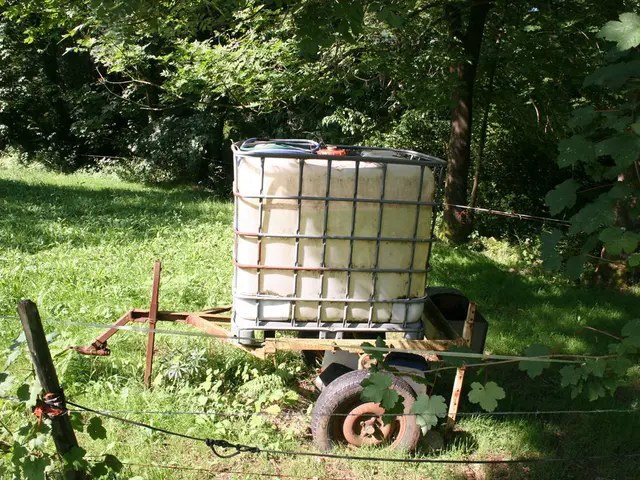What's the Real Recipient of Green Job Opportunities?
In a recent report, it has been highlighted that the green economy's job market continues to struggle with gender inequality. The argument that care jobs are green jobs was first taken up in 2019 by a coalition of organisations in the U.S. under the name Feminist Agenda for a Green New Deal (FGND).
The report reveals that in the wind industry, women represent only 8% of senior management posts. This is a concerning figure, as the creation of "green" jobs in male-dominated industries like energy and construction risks perpetuating gender inequality in the labor market.
In the Global North, green jobs are disproportionately held by white workers, who are also more highly paid. This trend is not exclusive to the Global North, as women, particularly women of color, are vastly underrepresented in "green" industries. In 2019, women held just 32% of jobs in renewables worldwide.
However, the report also highlights some positive developments. In solar, for instance, women account for 58% of those employed in administrative jobs compared with less than a third of those in science, technology, engineering, and math (STEM) positions.
The FGND argues that investment in the care sector can create millions of well-paid, unionized, low-carbon jobs for women and marginalized groups. This call for investment speaks to the need to shift to a different value system that focuses on reciprocity, cooperation, and mutuality, rather than profit maximization.
The report also emphasizes the need for overhauling the global financial architecture and redressing unequal-and often colonial-power relations between countries in the Global North and in the Global South. The current fixation on GDP would need to be replaced by measures of environmental wellbeing, social justice, and human rights.
Efforts such as upskilling and reskilling—for example, training women in climate-smart agriculture or solar panel maintenance—have shown that women's productivity could significantly increase, thereby benefiting entire communities through more resilient and inclusive economic growth.
At policy and institutional levels, key international and regional organisations advocate for a strong, deliberate focus on meaningful participation, equitable access to benefits, and social safeguard mechanisms throughout green growth processes to avoid reinforcing existing inequalities.
In Europe, gender employment gaps persist in green jobs, with countries like Greece, Romania, and Malta evidencing notable disparities. Existing green economy policies have often focused on protecting male-dominated jobs, with insufficient attention to gender-specific impacts or promoting women's participation in new green sectors.
Addressing these issues requires integrated policy interventions, targeted upskilling, community engagement to shift gender norms, and systematic focus on social inclusion to ensure the green economy promotes gender equality rather than perpetuating disparities.
The report concludes by stating that the transition to decarbonized societies will result in millions of new, well-paid jobs for construction workers, electricians, and engineers in sectors like clean steel, renewable heat, and renewable energy. However, it is crucial that these jobs are distributed equitably and that women and marginalized groups are not left behind in this transition.
The Energy Sector Women's Leadership Initiative (ESWLI) provides management skills training for women in the energy sector across Africa. Such initiatives are crucial in ensuring that women are equipped with the skills needed to take up leadership roles in the green economy.
The FGND distinguishes between outside-the-system and inside-the-system approaches to redressing gender inequality, and argues that both are necessary. The report highlights that environmental degradation affects all aspects of the lives of care workers, particularly in the Global South, where they are on the frontlines of the climate crisis.
In conclusion, the green economy's current job market tends to perpetuate gender inequality mainly because of structural barriers, social norms, policy frameworks, and marginalization. Addressing these issues requires a comprehensive approach that includes policy interventions, upskilling, community engagement, and a focus on social inclusion.
- The wind industry's senior management positions are dominated by men, making up 8% of these posts, as highlighted in a recent report.
- Care jobs are green jobs and were first advocated by the Feminist Agenda for a Green New Deal (FGND) in 2019.
- Green jobs are disproportionately held by white workers in the Global North, with women, particularly women of color, being vastly underrepresented worldwide in "green" industries.
- The FGND suggests investment in the care sector can create millions of well-paid, unionized, low-carbon jobs for women and marginalized groups.
- In solar energy, women occupy 58% of administrative positions but are less represented in science, technology, engineering, and math (STEM) roles.
- A shift to a new value system focusing on reciprocity, cooperation, and mutuality, rather than profit maximization, is needed, as advocated by the FGND.
- To address gender inequality in the green economy, efforts like upskilling women in climate-smart agriculture and solar panel maintenance are crucial.
- Key international organizations advocate for a focus on meaningful participation, equitable access to benefits, and social safeguards in green growth processes.
- Inequalities persist in green jobs in Europe, with countries like Greece, Romania, and Malta showing significant disparities, and existing green economy policies often fail to promote women's participation.




